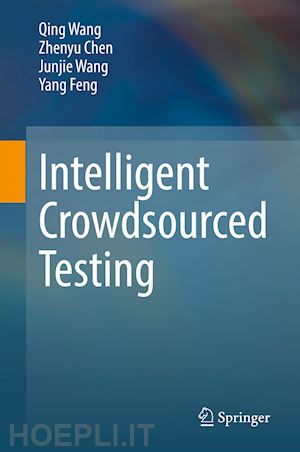
Questo prodotto usufruisce delle SPEDIZIONI GRATIS
selezionando l'opzione Corriere Veloce in fase di ordine.
Pagabile anche con Carta della cultura giovani e del merito, 18App Bonus Cultura e Carta del Docente
Crowdsourced testing is an emerging paradigm that can improve the cost-effectiveness of software testing and accelerate the process, especially for mobile applications. It entrusts testing tasks to online crowdworkers whose diverse testing devices/contexts, experience, and skill sets can significantly contribute to more reliable, cost-effective and efficient testing results. It has already been adopted by many software organizations, including Google, Facebook, Amazon and Microsoft.
This book provides an intelligent overview of crowdsourced testing research and practice. It employs machine learning, data mining, and deep learning techniques to process the data generated during the crowdsourced testing process, to facilitate the management of crowdsourced testing, and to improve the quality of crowdsourced testing.
o Chapter 1: Introduction
o Chapter 2: Preliminarieso Chapter 3: Book structure
· Part 2: Crowdsourced Testing Workers Characterization and management
o Chapter 5: Characterization of Crowd Workers
o Chapter 6: Task Recommendation for Crowd Worker· Part 3: Crowdsourced Testing Tasks recommendation and allocation
o Chapter 7: Crowd Worker Recommendation for Testing Tasks
o Chapter 8: Crowdsourced Testing Tasks Management
· Part 4: Crowdsourced test report classification and aggregation
o Chapter 9: Classification of Crowdsourced Testing Reportso Chapter 10: Duplicate Detection of Crowdsourced Testing Reports
o Chapter 11: Prioritization of Crowdsourced Testing Reports
o Chapter 12: Summarization of Crowdsourced Testing Reports
o Chapter 13: Quality Assessment of Crowdsourced Testing Cases· Part 5: Conclusions and future perspectives
o Conclusions and future perspectives
Qing Wang is a researcher at the Institute of Software Chinese Academy of Sciences (ISCAS). She is also the deputy chief engineer of ISCAS and director of Laboratory for Internet Software Technologies of ISCAS. She currently serves as a director of the Board of Directors of the International Software and Systems Processes Association (ISSPA), the member of the International Software Engineering Research Network (ISERN), a member of the editorial board of Information and Software Technology Journal (IST) and Journal of Software Evolution and Process (JSEP), and the CMMI lead appraisal. She has served as the general chair of ESEM in 2015, the program chair of ICSP from 2007 to 2009. Her research lies in the area of software process, software quality assurance, requirement engineering, knowledge engineering, big data, and artificial intelligence for software engineering. She has 20 years of experience in software process and quality assurance technologies. Her recent research related to software process and quality management has won the second prize of National Progress in Science and Technology of China and second prize of Progress in Science and Technology of Beijing. She has edited/co-edited 5 books and published more than 100 papers in international high-level conferences and journals.
Zhenyu Chen is the founder of Mooctest (mooctest.net), and he is currently a Professor at the Software Institute, Nanjing University. He received his bachelor and Ph.D. in Mathematics from Nanjing University. He worked as a Postdoctoral Researcher at the School of Computer Science and Engineering, Southeast University, China. His research interests focus on software analysis and testing. He has more than 100 publications in journals and proceedings, including TOSEM, TSE, JSS, SQJ, IJSEKE, ISSTA, ICST, QSIC, etc. He has served as the associated editor for IEEE Transactions on Reliability, PC co-chair of QRS 2016, QSIC 2013, AST2013, IWPD2012, and the program committee member of many international conferences. He also founded the NJSD (Nanjing Global Software Development Conference). He has won research funding from several competitive sources such as NSFC. He owns more than 40 patents (22 granted), and some of his patents have been transferred into well-known software companies such as Baidu, Alibaba and Huawei.
Junjie Wang is an associate researcher at the Institute of Software, Chinese Academy of Sciences (ISCAS). She received the PhD degree from ISCAS in 2015. She was a visiting scholar at North Carolina State University from Sep.2017 to Sep.2018 and worked with Prof. Tim Menzies. Her research interests include crowdsourced testing, mining software repositories, and intelligent software engineering. She has more than 20 high-quality publications and has received the ACM SIGSOFT Distinguished Paper Award at ICSE in 2019 and 2020 respectively, as well as IEEE Best Paper Award at QRS in 2019.
Yang Feng received bachelor’s and master’s degrees in software engineering from Nanjing University in 2011 and 2013, respectively. He obtained the Ph.D. at the University of California, Irvine. He has published more than 30 referred papers and regularly serves PC member and reviewer for international conferences and journals. His current research interests lie in software testing, crowdsourced software engineering, and program analysis.











Il sito utilizza cookie ed altri strumenti di tracciamento che raccolgono informazioni dal dispositivo dell’utente. Oltre ai cookie tecnici ed analitici aggregati, strettamente necessari per il funzionamento di questo sito web, previo consenso dell’utente possono essere installati cookie di profilazione e marketing e cookie dei social media. Cliccando su “Accetto tutti i cookie” saranno attivate tutte le categorie di cookie. Per accettare solo deterninate categorie di cookie, cliccare invece su “Impostazioni cookie”. Chiudendo il banner o continuando a navigare saranno installati solo cookie tecnici. Per maggiori dettagli, consultare la Cookie Policy.